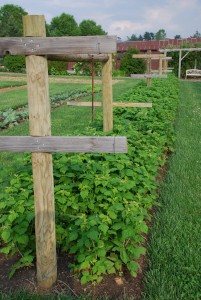Everbearer raspberries are easier to grow compared to the June-bearer types. Everbearer types are often called “fall bearers” because they produce berries from very late July to late September. Pruning becomes a simple chore – in late winter simply cut down all canes (shoots) to the ground. The traditional June crop is lost, but the new spring canes produce a large summer- fall crop.
Fall bearers grow best in full sun and in well-drained soil. Raspberries prefer a soil pH of 5.6 to 6.2. Drip irrigation over the summer months is needed to keep plants stress-free during incessant summer heat and drought periods. Mulching also aids in weed prevention and retaining soil moisture. In March and May apply one pound of 10-10-10 garden fertilizer per 100 square feet of bed. Do not fertilize in summer.
For backyard fruit enthusiasts grow raspberries on raised beds. Construct a sturdy trellis for cane support during the summer. This keeps most of the fruit off the ground and easier to pick. Trellis should be strongly built to handle the heavy yields starting in the 3rd season. The canes will bend down the support wires.
‘Caroline’, ‘Nantahala’, ‘Autumn Britten’, ‘Fall Red’ and ‘Heritage’ are reliable red everbearer varieties. ‘Anne’ and ‘Fall Gold’ are golden tinted red everbearer berries. Fall bearing raspberries are easily available from on-line e-commerce nurseries. Purchase only rooted canes which are certified disease-free.
A patch of raspberries provides many years of healthy and luscious fruits, high in fiber and loaded with minerals, vitamins, anti-oxidants, and anti-carcinogens.


 Posted in
Posted in 
